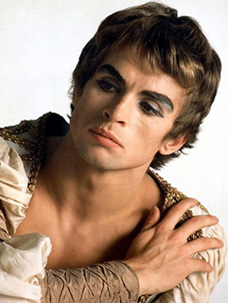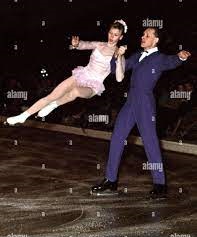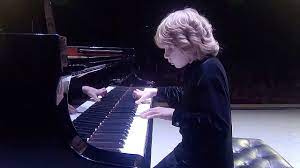|

Anna Pavlova (1881-1931), born in St. Petersburg, Russia to a poor peasant family, trained at the Imperial Ballet School until she graduated at age 18. She then danced with the Mariinsky Theatre. In the first years of the Ballets Russes, she worked briefly for Serge Diaghilev before founding her own company and performing throughout the world.
Her most famous showpiece was  'The Dying Swan' choreographed for her by Michel Fokine. The music piece was the Swan part of Camille Saint-Saën's 'The Carnival of the Animals'. 'The Dying Swan' choreographed for her by Michel Fokine. The music piece was the Swan part of Camille Saint-Saën's 'The Carnival of the Animals'.
"As in the case in all branches of art, success depends in a very large measure upon individual
initiative and exertion and cannot be achieved except by dint of hard work"
- Anna Pavlova - "Master technique and then forget about it and be natural"

|
Mathilda Kschessinskaya, born "Matylda Felixovna Krzesiñska" to a polish family, was the first Russian classical dancer to master 32 (thirty-two) consecutive fouette en tournant ("whipped turns" done in place on one leg).
 Ms. Kschessinskaya studied under Christian Johansson and Enrico Cecchetti at the Imperial Ballet School in St. Petersburg and made her dèbut in a pas de deux from 'La Fille Mal Gardèe' during a graduation performance in 1890 attended by Czar Alexander III. and the rest of the Imperial family, including the future Nicholas II. In 1896, she obtained the rank of 'Prima Ballerina Assoluta' of the St. Petersburg Imperial Theatres, a title awarded by the Imperial Ballet to only one other dancer. At the post-performance dinner, Czar Alexander sought out the young Kschessinskaya and told her to "Be the glory and adornment of our ballet." In 1911, she danced in London with Vaslav Nijinsky in "Swan Lake" where she met the Grand Duke Andrè Vladimirovitch whom she later married and had a son with. Ms. Kschessinskaya studied under Christian Johansson and Enrico Cecchetti at the Imperial Ballet School in St. Petersburg and made her dèbut in a pas de deux from 'La Fille Mal Gardèe' during a graduation performance in 1890 attended by Czar Alexander III. and the rest of the Imperial family, including the future Nicholas II. In 1896, she obtained the rank of 'Prima Ballerina Assoluta' of the St. Petersburg Imperial Theatres, a title awarded by the Imperial Ballet to only one other dancer. At the post-performance dinner, Czar Alexander sought out the young Kschessinskaya and told her to "Be the glory and adornment of our ballet." In 1911, she danced in London with Vaslav Nijinsky in "Swan Lake" where she met the Grand Duke Andrè Vladimirovitch whom she later married and had a son with.
Ms. Kschessinskaya set up her own ballet school in Paris, where she taught many famous pupils. Then came World War II and the fall of Paris, yet Kschessinskaya managed to continue teaching through most of this period. After the war, she endured many hardships: a pain in her hip almost stopped her from teaching, the sadness of the death of her friends and that of her beloved Andrè. She died in Paris in 1971 at 99 years of age, merely eight months short of her 100th birthday.
|
|
 Pushkin -
Pushkin -







 Baryshnikov and Godunov Biographies
Baryshnikov and Godunov Biographies 



![]() Live
Live
 Ms. Kschessinskaya studied under Christian Johansson and Enrico Cecchetti at the Imperial Ballet School in St. Petersburg and made her dèbut in a pas de deux from 'La Fille Mal Gardèe' during a graduation performance in 1890 attended by Czar Alexander III. and the rest of the Imperial family, including the future Nicholas II. In 1896, she obtained the rank of 'Prima Ballerina Assoluta' of the St. Petersburg Imperial Theatres, a title awarded by the Imperial Ballet to only one other dancer. At the post-performance dinner, Czar Alexander sought out the young Kschessinskaya and told her to "Be the glory and adornment of our ballet." In 1911, she danced in London with Vaslav Nijinsky in "Swan Lake" where she met the Grand Duke Andrè Vladimirovitch whom she later married and had a son with.
Ms. Kschessinskaya studied under Christian Johansson and Enrico Cecchetti at the Imperial Ballet School in St. Petersburg and made her dèbut in a pas de deux from 'La Fille Mal Gardèe' during a graduation performance in 1890 attended by Czar Alexander III. and the rest of the Imperial family, including the future Nicholas II. In 1896, she obtained the rank of 'Prima Ballerina Assoluta' of the St. Petersburg Imperial Theatres, a title awarded by the Imperial Ballet to only one other dancer. At the post-performance dinner, Czar Alexander sought out the young Kschessinskaya and told her to "Be the glory and adornment of our ballet." In 1911, she danced in London with Vaslav Nijinsky in "Swan Lake" where she met the Grand Duke Andrè Vladimirovitch whom she later married and had a son with.



